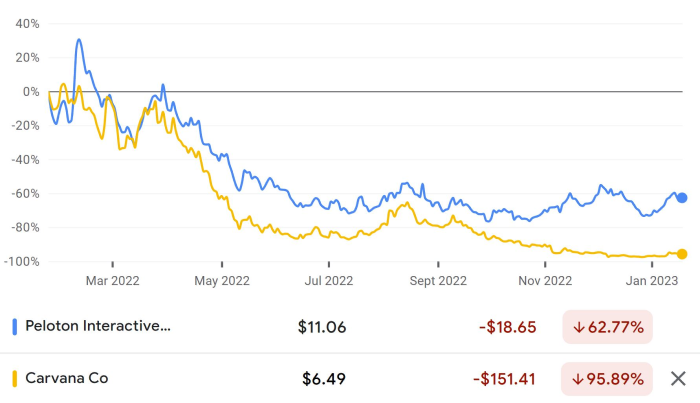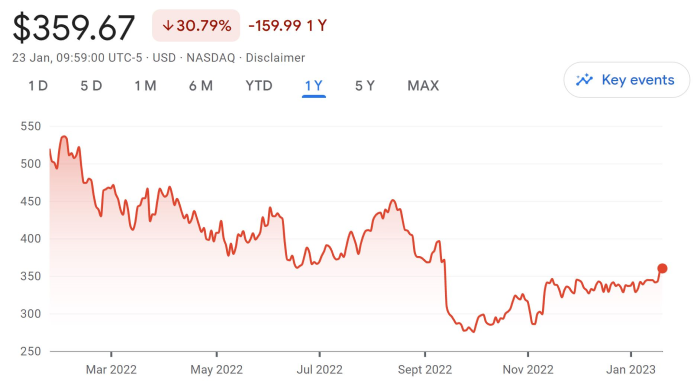Last year was the Monks Investment Trust’s “annus horribilis,” according to manager Spencer Adair, after it dropped 31% in 2022.
Stocks struggled throughout the course of 2022 owing to myriad headwinds, including surging inflation, interest rate hikes and Russia’s invasion of Ukraine but the FE fundinfo Alpha Manager said “four of the five biggest mistakes” in his career came in the past 12 months.
Monks’ holdings in Russian companies VK and Sberbank “essentially went to zero” after the invasion of Ukraine, making then the two worst performing stocks in the trust’s history. The trading of shares in the Russian social network and bank have been suspended by the London Stock Exchange since March last year.
Adair added that he had misjudged two stocks that he bought during the pandemic and sold out of last year, despite the trust’s preference to be a long-term investor in its holdings.
Used car dealer Carvana dropped 95.9% over the past year while exercise equipment maker Peloton fell 62.8%. Both companies made a roaring trade during the pandemic, but Adair revaluated his long-term forecasts for them after the volatile markets of last year brought expectations back to reality.
Share price of Carvana and Peloton over the past year

Source: Google Finance
He said: “They were hyped up during the Covid bubble, which we stuck with and bought all the way down and very quickly reversed. Our typical holding period is seven to eight years but Carvana and Peloton lasted less than 12 months, so that was a very unusual reversal and clearly not ideal.”
Indeed, Adair removed 20 names from the portfolio last year, but said that he should have started pulling back earlier on.
“The thing I got wrong was I should have been much more aggressive at trimming back the rapid growth stocks,” he said.
“We were going through it case by case, trying to be very careful, when we should have acted faster – that was the fundamental mistake.”
However, Adair argued that gearing will play a pivotal role in recovering lost returns and improving Monks’ long-term profile.
Last year he cut spending and retreated from volatile stocks, but this year Adair intends to “gently reapply the accelerator” as share prices drop to attractive levels.
He said: “The new thing that’s come from this is that the absolute valuations are very supportive, so we're like kids in a sweet shop at the moment.”
Adair has already bought new holdings in Adobe, Farfetch and Royalty Pharma in recent months as market turmoil brings them into reachable distance.
Adobe in particular has been on Adair’s watchlist for several years but has always been too expensive to justify a purchase, but its 31.4% decline over the past year provided a strategic entry point.
Share price of Adobe over the past year

Source: Google Finance
Adair said: “We are now looking at areas where people are getting very fearful and where there is a lot of change.
“I can’t guarantee that our new buys or existing holdings will be in union with the short term, but the point of buying these things is that you're taking advantage of short-term fear because it's a long-term opportunity.”
Moving forward, he said markets will be characterised by stubborn inflation, temporary consumption and expensive borrowing costs, which is not an ideal place to be as a growth investor.
However, investors can capitalise on that fear and depressed valuations to buy “one or two good companies that justifies an awful lot of mistakes”, according to Adair.
He said: “We’ve recognised that the conditions have changed. It's not the environment that we would choose, but neither is it one that particularly troubles us.”
The market is overvaluing companies that can perform well in the near term because they’re desperate for certainty, but much better long-term opportunities can be found at bargain prices.
For example, investors have flooded to consumer staples company Walmart as concerns of a recession rise, but it is trading at a price to earnings ratio of over 40.
Adair said: “You can actually buy companies which are growing, which have a higher returns than the structural rates of Walmart, at half the valuation, so that's a real opportunity.”
It is for this reason that Adair intends to move away from stalwarts (established franchises with strong competitive advantage) over the next year and into cyclicals (companies with skilled management and structural growth).
Buying overpriced companies that can provide short-term protection is not an advantageous move when so many good companies are becoming more affordable, according to Adair.
Instead, having liquid assets and money to spend could be more beneficial for the long-term health of investors’ portfolios.
Adair said: “Having options and dry powder during market turmoil is really valuable. These things allow you to cash in and move capital to take advantage of market conditions.”





